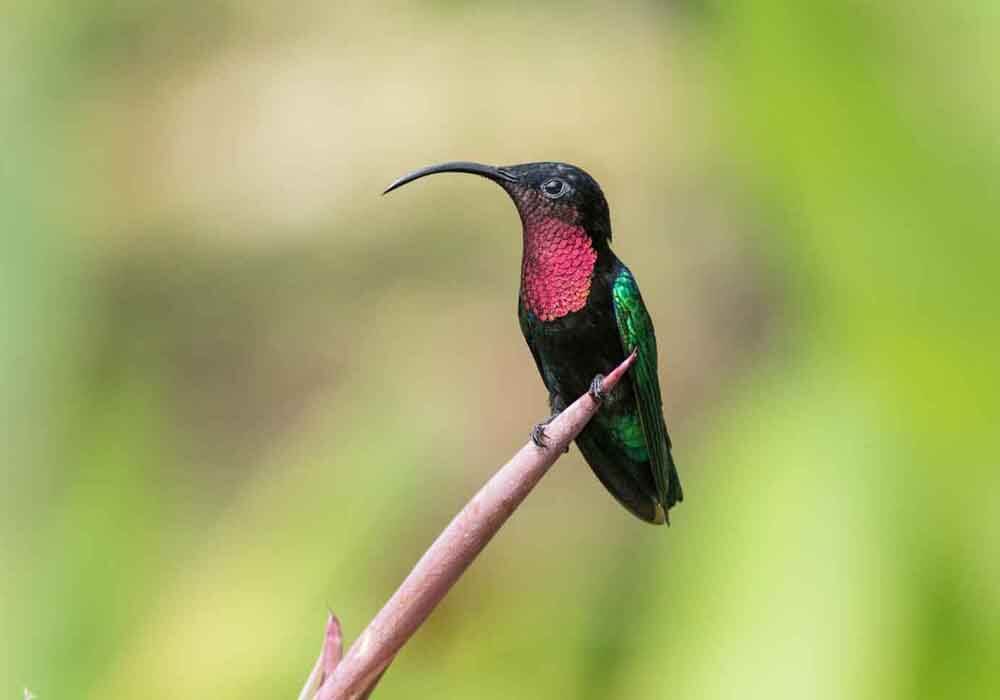Do Hummingbirds Sleep?
What Are The Sleep Habits Of The Hummingbird?
Despite their tiny bodies, hummingbirds are one of the most active birds in the world. However, people rarely see these cute little birds sleep, which leads to the common question: do hummingbirds sleep?
Hummingbirds sleep and have one of the most fascinating sleep behaviors of garden birds. These tiny birds hang upside down like bats and induce a mini hibernation called torpor every night to recharge for another day of drinking nectar and catching bugs.
This article will answer whether hummingbirds really sleep and reveal more about their sleeping patterns. From their strange sleeping locations to why their peculiar method of sleep is so essential, no stone will be left unturned. Let’s get started.

Do Hummingbirds Sleep at Night?
Hummingbirds sleep at night, and much like humans, they operate on a circadian rhythm. This means that the lack of light in the evening will trigger the hummingbird's sleep cycle to kick in. When it gets brighter as dawn comes, the hummingbird will start to wake up and begin its day.
There are a few exceptions to this. Because the hummingbird can only distinguish between light and dark, not day and night, their circadian rhythm can be interrupted by artificial lights. Urban development can be a massive issue for hummingbirds, who need to constantly feed while awake.
When a hummingbird stays awake throughout the night due to artificial lights, it will continue to search for food. Due to their high metabolisms, a hummingbird can't last long without food while awake.
Being awake at night puts hummingbirds at risk of being unable to sufficiently feed themselves and even freezing to death. This is because their primary defense against the cold weather comes from their sleep.
There is one exception to this. Some species of hummingbird will undertake a 20-hour migration. When they do this, they have no place to stop and sleep. They can survive this journey by preparing. This isn't typical hummingbird behavior and shouldn't be done often.
How Much Sleep Does a Hummingbird Need?
Hummingbirds don't need a specific amount of sleep to function, and their sleep cycles often depend on the season. They will sleep at dusk and wake in the light, no matter how many hours of sleep that gets them.
However, they do have to constantly feed to remain alive during waking hours due to their insanely high metabolisms.
So, do hummingbirds sleep for long? The answer is yes—they can sleep all night until the morning when the sun comes out to play.
When sleeping, hummingbirds survive by lowering their heartbeat to around 50 beats per minute. This technique is called torpor sleep. Torpor sleep is similar to hibernation, where an animal will slow its heart rate and enter a restful period to conserve energy in the winter.
However, the hummingbird will perform this every night.
There are a couple of reasons that the hummingbird does this. As the world's smallest bird, a hummingbird hasn't much room to store energy.
If the hummingbird were to sleep with its average heart rate, it would quickly waste its energy and promptly starve to death. Its small body also leaves it susceptible to cold, and this technique means that there is no energy wasted.

Hummingbirds love a good birdbath, but not just anyone will do! This helpful article of mine offers tips on chosing the right one, as well as reviewing those Hummingbird birdbaths that attract them the most.
What Is Hummingbird Sleep Called?
There isn't a specific name for hummingbird sleep. However, they use a particular technique of rest called torpor sleep, similar to a short hibernation. This type of sleep isn't exclusive to hummingbirds, and many small animals will do this to conserve energy, especially during colder months.
During this sleep, their bodies undergo physical changes that a hibernating animal goes through in a few hours.
A few changes happen to the hummingbird's body during torpor sleep. In REM sleep—the type of sleep humans tend to do—our body temperatures will drop a little and we regain energy. However, we are still present and ready to be alert quickly if woken suddenly. A hummingbird cannot do this.
Hummingbirds tend to sleep a lot deeper, which makes them almost like they’re dead.
Torpor sleep involves a total shutdown of the body. Body temperature will drop significantly, and they will enter a deep rest that is incredibly difficult to be roused from.
It takes a while for a hummingbird to wake up from sleep, which is why they do it naturally in the daylight. This can put them in danger from predators. They cannot quickly wake themselves in an emergency.
Don't worry, though, as hummingbirds have their own methods of staying safe while asleep.
Do Hummingbirds Sleep Upside Down?
Hummingbirds do sleep upside down. This can be a strange sight, but don't be alarmed. They won't even know you're there, and moving them can be disorienting and potentially dangerous for them.
Hummingbirds mostly sleep at night, so it's unlikely that you'll see this strange phenomenon.
They sometimes rest in what might look like a nap, so if you have a hummingbird feeder in your garden, there's a slight chance that one might hang itself from the bottom of your feeder and have a quick rest.
Hummingbirds are completely fine when they rest in between meals, so leave them be and enjoy the remarkable feat of nature that you’re witnessing.
If you've never seen a sleeping hummingbird before, here is an incredible YouTube clip that shows one hanging upside down from a feeder, with a handy explanation of how hummingbirds sleep.
Want proof that Hummingbirds sleep upside down?
This interesting YouTube video proves just that!
Where Does a Hummingbird Sleep at Night?
As you have seen, hummingbirds can sleep on the bottom of bird feeders. However, this isn't a common occurrence for them. They will very rarely be seen resting on the feeder at night as it is too exposed.
If you have a bird box for hummingbirds, you may assume they sleep there. This isn't the case, either. Hummingbird bird boxes are great for nesting, but an adult hummingbird is unlikely to sleep in one outside the nesting season.
Hummingbirds prefer to sleep amongst the trees. They hang upside down from small branches, with their tiny feet maintaining their grip on the tree no matter how deep their sleep is. They prefer to sleep in a well-covered area, as predators might find them in the open.
The combination of their tiny sizes, the dense leaves they enjoy resting in, and their tendency to sleep at night, is probably why not many people have seen them sleeping.
The ideal places for hummingbirds to sleep are dense shrubberies and hedgerows. They also like well-covered trees with thin branches, such as fir trees. They will rarely choose a sparsely covered tree, which is why you have likely never seen a hummingbird hanging upside down like a bat while out at night.
Therefore, although these cute tiny birds sleep every night, it’s very unlikely that you’ll spot them unless you’re very intentional. Hummingbirds tend to sleep heavily, which explains why they must nap in extremely safe locations with little to no risks of predator attacks.

Sleeping is one thing, but what do Hummingbirds do at night in general? Are they nocturnal feeders? Do they have a bird nightlife? We answer this fascinating question in our Where Do Hummingbirds Go at Night? article.
Do Hummingbirds Sleep With Their Eyes Open?
Hummingbirds don’t sleep with their eyes open. While in torpor, they usually close their eyes, but their eyes may stay open for a while as they enter or exit this state.
Sleep and rest for a hummingbird are two different things, and if you see a hummingbird hanging upside down, it might look like it’s sleeping with its eyes open. But this isn’t sleep. Torpor is a deep form of rest that shuts the whole body down, including its eyes.
There are other explanations for this strange behavior by hummingbirds, though.
So what is it that you are witnessing? There are two possible explanations. Either the hummingbird isn't asleep or it’s waking up from a deep sleep and not fully conscious yet.
The first explanation is that the hummingbird is just resting and not trying to sleep, as it’s rather exhausting to fly from one food source to another. That’s why it might stop to rest for a while before continuing. When it does this, it may keep its eyes open so as not to fall asleep and leave itself open to predators. You’re unlikely to see this, as hummingbirds cannot go very long without eating.
If you see a hummingbird with its eyes open first thing in the morning, it may be exiting torpor sleep. Unlike human sleep cycles, which are decidedly light, a hummingbird is wholly powered down during sleep.
Waking up for a hummingbird is like a human waking from a coma. As a result, if you see a hummingbird hanging upside down with its eyes wide open, it may just be in the process of waking up.

Are Hummingbirds fussy nesters? What do their nests consist of? Our interesting article entitled What Do Hummingbirds Like To Nest In will answer this question.
Do Hummingbirds Sleep? Final Thoughts
Hummingbirds do sleep, but not the way that humans do. Even most birds don't sleep the way that a hummingbird does. Its enormous size to energy output ratio explains its need for deep sleep every night to function.
These cute little birds have some of the most fascinating sleep behaviors of any bird in the animal kingdom. From hanging like a bat to going into hibernation every night, these little creatures are biologically programmed to thrive.
Just remember to be careful if you see one sleeping. It needs all the energy it can get.
Back To The TOP Of This Do Hummingbirds Sleep Page

About the Author...
Richard Worden, a dedicated bird lover for over 20 years, I love to share my in-depth knowledge and passion for birds. Read more About Me and my expertise in this field.
- We Know Birds HOME ›
- Hummingbird Facts and Information ›
- Do Hummingbirds Sleep?
